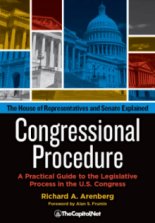A Guide to Understanding the Presidential Budget
See President’s Budget (CongressionalGlossary.com) The president’s budget, officially known as the Budget of the United States Government, is required by law to be submitted “On or after the first Monday in January but not later than the first Monday in February of each year.” (31 USC 1105). The budget contains estimates for spending as well … Read more




